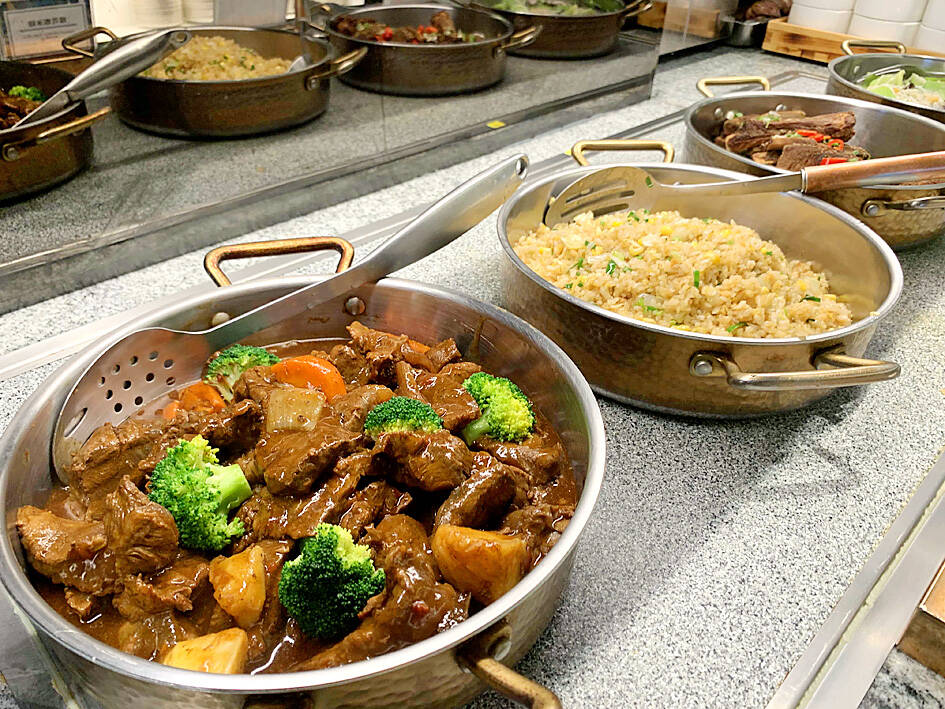The Executive Yuan yesterday approved a proposal to lift a ban on importing Canadian beef from cattle older than 30 months.
The new rules are to take effect immediately, Food and Drug Administration (FDA) Director Wu Shou-mei (吳秀梅) told a news conference.
Taiwan previously only imported Canadian beef from cattle under 30 months old. It lifted similar restrictions on imports of US beef from cattle over the age of 30 months on Jan. 1, 2021.

Photo: Tsai Shu-yuan, Taipei Times
Due to the relatively long incubation period of mad cow disease, cows aged under 30 months are generally thought to be at lower risk of having the disease.
The FDA on April 27 issued a notice on lifting the ban and commenced a 30-day public comment period before the Cabinet approved the proposal.
However, Taiwan will still ban specific risk materials for Canadian beef imports, including the brain, eyes and spinal cord, among other parts, Wu added.
After the ban is lifted, Taiwan would randomly select batches of imports for inspection at a rate of 2 to 10 percent, she said.
Imported products that fail an inspection would be destroyed or returned, and if the number of violations becomes concerning, such imports would be subject to “enhanced random inspections” or “batch-by-batch checks,” Wu added.
Currently, 55 countries, including the US, the UK and Japan, allow imports of Canadian beef, Cabinet spokesman Lin Tze-luen (林子倫) told the news conference.
The move to allow imports of Canadian beef from cattle over the age of 30 months came after a government source said that the ban could be a major stumbling block between Ottawa and Taipei, as they negotiate a deal to encourage two-way investment, called the Foreign Investment Promotion and Protection Agreement.
The source said progress on reaching a deal was going “very smoothly” until negotiations turned to the 30-month slaughter-age limit.
The source added that the government was hopeful that Canada would support Taiwan’s accession to the Comprehensive and Progressive Agreement for Trans-Pacific Partnership (CPTPP).
The Consumers’ Foundation in a news release yesterday called for a boycott of Canadian beef, saying the North American nation’s last reported case of mad cow disease was fairly recent and it has not clarified feed contamination concerns.
When Ottawa reported a case of mad cow disease in December 2021, South Korea, China and the Philippines stopped importing Canadian beef, it said, opposing the government’s decision to open imports.

The first two F-16V Bock 70 jets purchased from the US are expected to arrive in Taiwan around Double Ten National Day, which is on Oct. 10, a military source said yesterday. Of the 66 F-16V Block 70 jets purchased from the US, the first completed production in March, the source said, adding that since then three jets have been produced per month. Although there were reports of engine defects, the issue has been resolved, they said. After the jets arrive in Taiwan, they must first pass testing by the air force before they would officially become Taiwan’s property, they said. The air force

The Coast Guard Administration (CGA) yesterday said it had deployed patrol vessels to expel a China Coast Guard ship and a Chinese fishing boat near Pratas Island (Dongsha Island, 東沙群島) in the South China Sea. The China Coast Guard vessel was 28 nautical miles (52km) northeast of Pratas at 6:15am on Thursday, approaching the island’s restricted waters, which extend 24 nautical miles from its shoreline, the CGA’s Dongsha-Nansha Branch said in a statement. The Tainan, a 2,000-tonne cutter, was deployed by the CGA to shadow the Chinese ship, which left the area at 2:39pm on Friday, the statement said. At 6:31pm on Friday,

The Chinese People’s Liberation Army Navy’s (PLAN) third aircraft carrier, the Fujian, would pose a steep challenge to Taiwan’s ability to defend itself against a full-scale invasion, a defense expert said yesterday. Institute of National Defense and Security Research analyst Chieh Chung (揭仲) made the comment hours after the PLAN confirmed the carrier recently passed through the Taiwan Strait to conduct “scientific research tests and training missions” in the South China Sea. China has two carriers in operation — the Liaoning and the Shandong — with the Fujian undergoing sea trials. Although the PLAN needs time to train the Fujian’s air wing and

STRIKE: Some travel agencies in Taiwan said that they were aware of the situation in South Korea, and that group tours to the country were proceeding as planned A planned strike by airport personnel in South Korea has not affected group tours to the country from Taiwan, travel agencies said yesterday. They added that they were closely monitoring the situation. Personnel at 15 airports, including Seoul’s Incheon and Gimpo airports, are to go on strike. They announced at a news conference on Tuesday that the strike would begin on Friday next week and continue until the Mid-Autumn Festival next month. Some travel agencies in Taiwan, including Cola Tour, Lion Travel, SET Tour and ezTravel, said that they were aware of the situation in South Korea, and that group